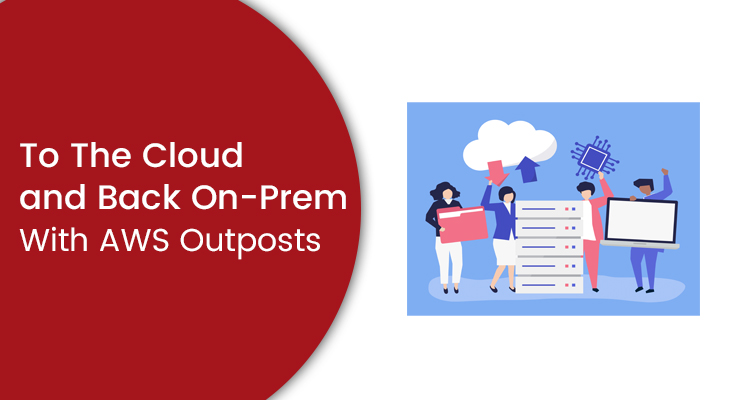Ask most people what they consider to be the core value of the AWS cloud, and they’ll probably include things like AWS’ scalability and flexibility. While this refers to their public cloud offerings, the same can be said about AWS Outposts—and maybe even more so.
AWS Outposts, announced at last year’s AWS reinvent, is a fully managed service that offers AWS infrastructure, AWS services, APIs, and other tools to virtually any data center, co-location space, or on-premises facility. In short, you get AWS software and hardware in your choice of location connected seamlessly to the broader AWS cloud. Flexibility meets scalability, with true hybrid-cloud infrastructure.
The power of the AWS Cloud—when added to an on-premises datacenter—is a compelling value proposition for businesses embracing the cloud natively or through migration of workloads. From an operations standpoint, cloud professionals in highly regulated markets like healthcare, financial services, and government now have the ability to leverage the latest and greatest AWS cloud services and still adhere to strict data privacy and compliance rules with on-premises workloads. Industries that crave low-latency compute capabilities, such as high-frequency trading, medical labs, and academia, can use AWS Outposts to shorten the path for computational horsepower from multiple jumps to a direct connection to their data centers.
Additionally, AWS Outposts allows more traditional enterprises to dip their toes into the public cloud with regard to their data centers and use it as an on-ramp to cloud migration. This is exactly why PagerDuty is excited to extend our partnership with AWS through AWS Outposts.
For organizations that are migrating workloads to an AWS Outposts-based hybrid cloud, it’s important to understand the implications on a) your technology stack, b) people, culture, and skills, and c) operational process. PagerDuty, when combined with a full-service ownership model, plays an essential role in empowering and connecting all three of these focus areas.
pulse tech’ integration with AWS Outposts leverages the popular Amazon CloudWatch integration on-premises. This linkage happens through AWS Simple Notification Service(SNS) Topic, which is agnostic to the AWS workloads location, whether it is in the public cloud or Outposts.
Defining AWS Outposts
AWS Outposts enable businesses to run AWS infrastructure on their own premises. It increases the hybrid cloud system’s consistency. AWS Outposts combines the greatest features of two eras, on-premises infrastructure, and cloud computing, into a single service. It means that you get the best of both models at a low cost and with a flexible framework. As a result, the AWS Outposts technology can provide you with the best resource usage at the best price.
The adaptability of AWS Outposts is what makes it so popular. Businesses can build a consistent hybrid user experience using the same APIs, hardware, tools, and functionality across on-premises and cloud systems.
The Advantages of AWS Outposts
AWS Outposts connects you to the nearest remote Amazon facility in your area, allowing you to get the most computational power, networking, and storage.In a nutshell, these are some of the advantages of using AWS outposts:
a. Security
When it comes to maintaining enterprise security, AWS Outposts is a world-class solution. Because the company’s data is sensitive and confidential, simply transferring it to the cloud could be dangerous. AWS Outposts enable businesses to keep sensitive data on their premises and maintain complete security control over the data. Due to strict security features and standards, AWS Outposts is one of the most acceptable ways to keep your data safe.
b. Virtual Servers in Local
You can run Amazon EC2 (Elastic Compute Cloud) on local infrastructure with Outposts. It allows you to run virtual servers on-premises as if they were in the cloud. As a result, you can scale up and down servers as needed and run Amazon Elastic Block Store.
c. Cost Optimized
You may use AWS Outpost to install the latest AWS tools on your local infrastructure. Many firms find that adopting AWS Outposts is less expensive than maintaining legacy on-premises systems.
d. Upgradation
AWS Outpost is more likely to receive next-generation technology upgrades than typical on-premises servers. AWS even allows for automatic updates for safe and economical operation.
Use Cases of AWS Outposts
- Financial Services – Low latency trade and data sovereignty are essential for local banking and payment services.
- Manufacturing – operate manufacturing automation and management systems near the production line.
- Retail– EPOS systems require local, dependable performance.
- Healthcare– Access to on-site medical equipment with a low delay
- Telecoms – Using AWS cloud technologies, create local Virtual Network Functions
- Media & Entertainment– With access to the newest GPU technology, you can stream live events.


